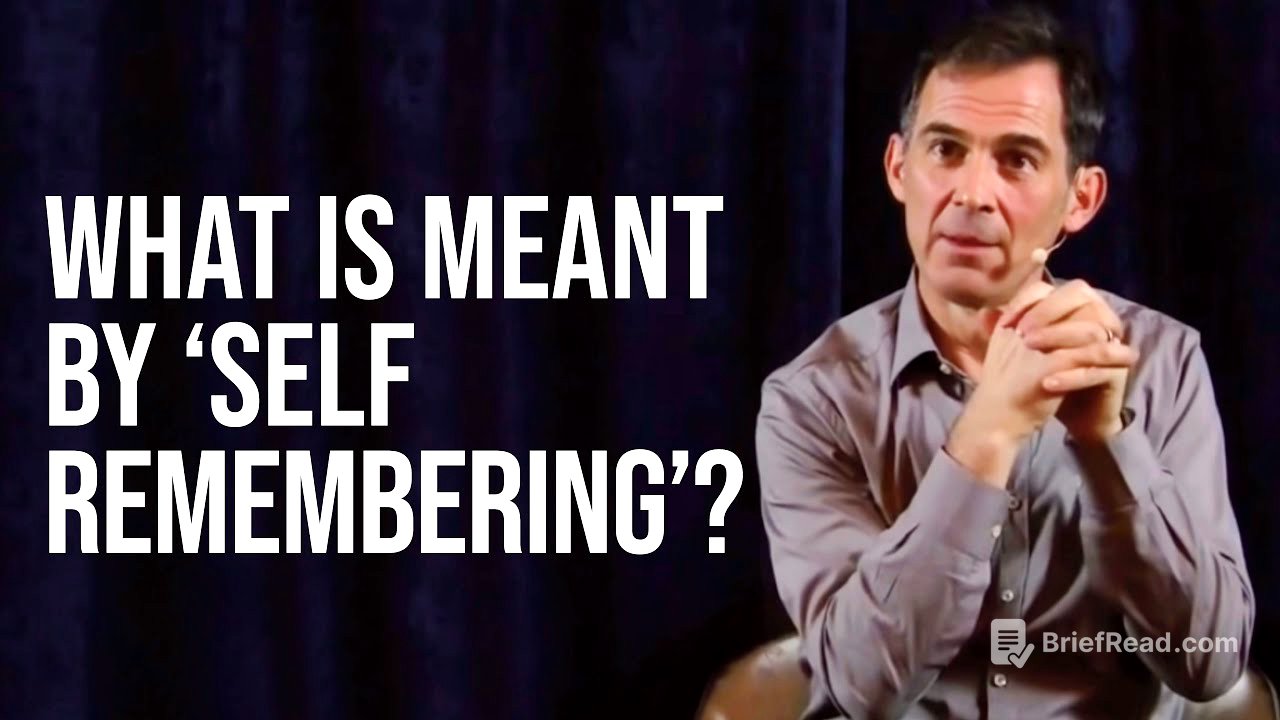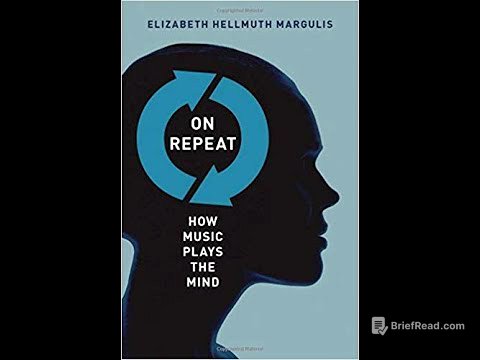TLDR;
This video explores the concept of "self-remembering," clarifying its meaning and practical application in daily life. It emphasizes that self-remembering is not about recalling oneself as an object of thought, but rather about resting attention in its source, which is awareness itself. The discussion covers how attention naturally flows between engaging with the world and returning to its source, and how filler objects and resistance prevent this natural flow. The video uses metaphors like a child returning to its mother and an actor stepping out of character to illustrate the process of recognizing our true identity as pure awareness.
- Self-remembering is being aware of being aware, not recalling oneself as an object.
- Attention naturally flows between engaging with the world and returning to its source.
- Resistance and "filler objects" perpetuate the separate self and prevent sinking back into awareness.
- Recognizing our true identity as pure awareness requires no effort from awareness's point of view.
What is meant by self remembering? [0:00]
The speaker defines "self-remembering" as being aware of being aware, which involves self-investigation, self-abidance, and returning attention to its source. Visualizing awareness as the source of attention, attention moves away to know objects and returns when not focused on an object. This concept is similar to practices like sinking the mind into the heart (Ramana Maharshi) and the practice of the presence of God (Christian tradition). The goal isn't constant merging with the source but rather a natural return when not engaged with objects.
Understanding self abidance [1:11]
Attention should engage with the world when required for practical, exploratory, or celebratory purposes. There is nothing wrong with the attention going out towards the object in these cases. After engaging with an object, attention should naturally return home to rest until needed again.
Why we find filler objects and substances [3:23]
When attention is no longer required by the world, it often creates "filler objects" to avoid sinking back into its source. These filler objects perpetuate the finite mind and separate self, as the mind avoids ceasing to exist by returning to its source. People turn to objects, substances, relationships, or even daydreams to keep attention occupied and maintain the illusion of a separate self.
Allowing the attention to go back to its source [4:17]
Engaging with objects is not inherently wrong. Moments of returning attention to its source are like punctuation marks throughout the day. Between these moments, attention naturally goes out to work, family, and other situations. When no longer needed, the most natural thing is to allow attention to sink back to its source.
Resting the focus of attention and finding peace [5:12]
Becoming accustomed to resting attention in its source creates an undercurrent of awareness that runs through all activities. This presence of peace remains in the background even when attention is engaged with the world. The speaker uses the analogy of a child and its mother to illustrate this, where the child initially focuses solely on the mother but gradually explores the world, periodically returning to the mother for reassurance and connection.
Our true identity in the peaceful presence of awareness [7:08]
The attention keeps returning to its source to re-establish our essential nature. Then the attention can safely go out into the world again because it knows that in the background of experience there is this peaceful presence of awareness, which is our true identity.
Clarification on self remembering [7:46]
The speaker clarifies that self-remembering is not about remembering oneself in the same way one remembers an object or event. If asked to remember breakfast, an image appears, and attention is directed towards it. However, one cannot direct attention towards awareness itself because awareness lacks objective qualities. The phrase "self-remembering" has been misunderstood, and it does not mean remembering yourself as an activity of the finite mind.
The importance of remembering [10:37]
The speaker emphasizes that anything you remember is an activity of the finite mind. The finite mind cannot know or remember its origin because its origin is not finite. The finite mind can only know something finite.
Sinking attention back into its source [12:56]
It is a sinking back or falling back of attention, or a resting of attention in its source, rather than a directing of attention. Self-investigation, self-remembering, and self-abiding are not something we do with the mind; it's a resting of the mind because awareness is not in any known direction.
What is Self investigation? [13:22]
Self investigation, self remembering, self abiding is not something we do with the mind, it's a resting of the mind.
King Lear analogy to explain self remembering [13:55]
The speaker uses the metaphor of an actor, John, playing King Lear to explain self-remembering. John becomes so immersed in the role that he continues to suffer even after the play ends. A friend helps him by guiding him to investigate the "I," leading John to realize he is not King Lear but John. Similarly, awareness has taken the shape of the finite mind and forgotten its true nature. Self-remembering involves taking the thought "I" and allowing attention to be drawn deeper into its essence, gradually shedding limitations and recognizing "I am pure awareness."
What is the 'I' [21:50]
If our attention is drawn to the essential nature of "I am" rather than the qualities added to it, we find pure aware being. The speaker suggests recalling an early childhood experience and comparing how it felt to be oneself then versus now. The feeling of being the knower of experience remains the same, unchanged by the experiences that have passed through it.
Allowing everything to be, without resistance [23:49]
Allowing everything to be without resistance is the beginning of attention sinking back. Resisting something engages attention with that object. By taking a position of no resistance and total allowing, attention disengages from objects. Then, allow this free attention to gradually sink back into its source, resting in the experience of being aware. From awareness's point of view, knowing its own being requires no effort; effort was needed to rise as the finite mind.









